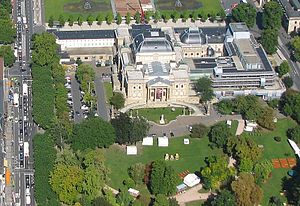Wiesbaden Festival
| Internationale Maifestspiele Wiesbaden | |
|---|---|

Aerial view of Hessisches Staatstheater Wiesbaden, the festival's main venue
|
|
| Genre | International theatre: opera, play, ballet and others |
| Begins | around 1 May |
| Ends | around 31 May |
| Frequency | annual |
| Location(s) | Hessisches Staatstheater Wiesbaden |
| Inaugurated | 1896 |
| Organised by | Hessisches Staatstheater Wiesbaden |
| Website | |
| english |
|
The Internationale Maifestspiele Wiesbaden (International May Festival, IMF) is a theater festival in Wiesbaden, Germany. Established in the late 19th century after the Bayreuth Festival, the festival is one of the most distinguished international theatre and music festivals in the world. It is presented annually in May at the Hessisches Staatstheater Wiesbaden, the State Theatre of Hesse in the capital Wiesbaden. The festival currently features performances of operas, ballets, plays and musicals. Visiting companies, mostly from European theaters, present their recent productions along with performances of the Theater Wiesbaden. Concerts from a wide array of music genres are featured as well as artistic circus acts and modern dance presentations. Lectures, recitals, cabaret performances, art showings and readings are also part of the program.
In 1896 the festival was established as "Kaiserfestspiele" (Imperial Festival) by Georg von Hülsen, director of the theater in Wiesbaden. He wanted to create a festival to compare with the successful Bayreuth Festival. A festival in Spring was supposed to coincide with the emperor's regular stay at the spa to create a cultural event. The director also wanted to improve the status of his "Neues königliches Hoftheater" (New Royal Court Theatre), which relied mostly on productions from the Royal theater in Berlin. The first festival was presented from 6 to 19 May 1896, with the German emperor William I and the empress Augusta of Saxe-Weimar-Eisenach in attendance. The posters and programs showed "Festspiele auf allerhöchsten Befehl!" (Festival by the very highest order!), referring to the emperor's demand. In the beginning the focus was on the works of Richard Wagner as in Bayreuth, but different from Bayreuth works of other composers were also performed, such as Carl Maria von Weber's Oberon in 1900. The festival closed for the duration of World War I.
...
Wikipedia
